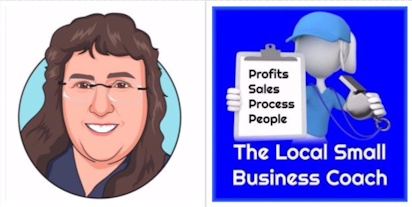By Katie Lundin, crowdspring.com, on September 7, 2017

No matter how successful you are or how good you are at what you do, there’s always room for improvement.
Sometimes an outside perspective is exactly what you need. Businesses coaches offer precious experience and tested strategies to help take your skills – and your business – to the next level.
There are a number of reasons why you may want to seek out a business coach.
As a business evolves and grows, you need to build new strategies and tactics to thrive. If you’re too busy, or too close to your business, you may not be able to make the adjustments needed for your business to grow. People often refer to this as working in the business versus working on the business.
Business coach and entrepreneur Scott Hallman (more on him below) shares his own cautionary tale in an interview with Mindvalley Insights:
“We began to lose money. See, I made the mistake of thinking that I had succeeded at this level here – I don’t need to make any structural changes to now take my business to the next level. And we had to scramble. We had to scramble to keep our reputation. I had to literally stop our growth… it was a humbling experience…”
Business coaching delivers the perspective you need to determine how your business needs to change in order to successfully evolve; and, the guidance to successfully implement those changes.
Do you struggle with accountability and follow through? As business guru Brian Tracy once observed,
You have to put in many, many, many tiny efforts that nobody sees or appreciates before you achieve anything worthwhile.
Accountability and self-discipline are vital to your business’s success. Business coaches provide that extra accountability you may need. Entrepreneur’s Jeff Boss writes:
A coach serves as an accountability partner who challenges you to strategize and develop your goals while aligning your efforts toward achieving them.
Finally, you may be struggling to achieve real, measurable results.
Intentions are great, but in business the bottom line is king. Good business coaching provides tried, actionable strategies that will deliver increased profits.
If you’re not ready to pull the trigger and hire a business coach today, we’ve got you covered. We’ve curated a list of 7 exceptional small business coaches sharing some of their best advice.
1) Brad Sugars

Image courtesy of ActionCoach
Brad Sugars is one of the top names in business coaching today. He started his journey as an entrepreneur by running a few small businesses while he was still attending university. In his twenties – already an in-demand speaker and business consultant, Brad founded Action International (now called ActionCOACH) in an effort to bridge the gap “between knowledge and implementation”.
Brad hired and trained business coaches to share his knowledge and strategies with a wider audience. Eventually, his coaches were in such high demand that Brad was forced to evolve his business, yet again. Brad franchised ActionCOACH; which now operates in 54 countries, coaching more than 15,000 businesses per week.
So what can you learn from the ActionCOACH? In his book Billionaire in Training Sugars asserts,
The smartest people in the world hire people smarter than themselves.
Brad Sugars clearly believes that hiring smart people can infuse new life into your business – after all, his entire empire is built around that premise. Hiring a business coach can certainly be a wise choice. But, his advice applies to more than just coaches or consultants.
Entrepreneurs who staff their business with people smarter than themselves ensure that their company has the best chance for survival. If you want to be the smartest person in the room, check your ego at the door and ask yourself why. Smarter employees are valuable resources providing a wealth of knowledge that will help your business thrive.
2) Tammy Adams

Image courtesy of Local Small Business Coach
Tammy Adams, host of the Local Small Business Coach Podcast started her career working for a Fortune 500 company. But, she always knew that the true passion was for helping others improve their careers. Today Tammy specializes in working with and training local small businesses.
Her goal is to help every small business owner make at least $100,000 a year in profit. Tammy recommends that to reach that goal one must first look inward:
Local small business owners are losing money left and right due to poor or weak processes in their business. It is critical that you take a look at your processes and fix the broken ones.
You’ve probably heard the expression “Don’t put lipstick on a pig, it wastes your time and annoys the pig.” The same is true of trying to grow a business with new endeavors without first taking the time to repair the parts that aren’t working.
Before you can take your business to the next level, you have to master the one you’re on. Take a good hard look at what’s working and what isn’t. Then fix the stuff that’s broken.
3) Barry Moltz

Author and entrepreneur Barry Moltz, is a 20-year small business veteran and a member of the Entrepreneurship Hall of Fame.
Moltz is a former professor of entrepreneurship, a nationally renowned speaker on small business and a successful coach who “gets small businesses unstuck.”
Moltz advocates not being afraid to get your feet wet when starting and running a business:
Only Experience Teaches You: You can’t learn skiing by watching videos. They might help but you still need to find a place with snow, put your skis on, and thrust yourself down the mountain.
It’s easy to become paralyzed by what we don’t know – or by the desire to be perfect – before we move forward. But Moltz reminds us that experience is an essential part of the process. That means you’ll have to learn on the job – an impossible task if you never get started at all.
So, be willing to take the risk. Don’t wait for perfection – you’ll never get there. And, as a wise muppet once said, “Do or do not. There is no try.”
4) Lanna Hill

Image courtesy of Behind the Brands
Lanna Hill is the founder and director of One Small Step Business Coaching. One Small Step provides one-on-one coaching services and workshops for small business owners. One year after launching One Small Step in 2015 Hill was nominated for the 2016 national AusMumpreneur Awards. Her business continues to grow, having just recently launched a series of e-courses for small businesses.
During an interview on the Australian podcast Mums With Hustle, Hill shares a valuable tool for prioritizing business opportunities:
I have a pretty easy question… When you get an opportunity or when something’s come your way; firstly, is it income-producing? Or, is it getting you closer to your goals?
It can be tempting to chase every white rabbit you meet down the rabbit hole in the hopes of finding a wondrous opportunity. But, with precious little time, money and resources, it’s important for small businesses to focus on the opportunities that will truly provide a return on investment.
Screening every potential deal through Hill’s easy 2-question filter provides a quick and easy way to analyze an opportunity’s merit so that you can prioritize what matters and move on.
5) Scott Hallman

Image courtesy of Mindvalley Insights
There’s a good chance that you’ve never heard of Scott Hallman. But, you should have. Jay Conrad Levinson of Guerilla Marketing shares,
Scott is the ultimate expert at profit optimization. I’ve written 31 books and he has made me feel like a failure because I have not addressed the simple, duplicable profit strategies that he teaches.
Scott Hallman is the founder of two Inc. 500 companies and a nationally recognized business trainer. He once built an IT consulting company to a value of $85M in under two years. Scott Hallman doesn’t mess around.
Hallman shares the central tenet of his strategies in a quick 5 min interview with Mindvalley Insights:
The fastest way to grow a business is to focus on ‘how can I improve on those steps of the things we’re already doing?’
Every business has profit-driving processes in place that generate revenue. Scott recommends making those processes as cost-efficient and profit-rich as possible. He goes on to explain that the money you save on those essentials becomes the profit you use to reinvest and grow your business.
6) Melinda Emerson

Image courtesy of Centric TV
Melinda Emerson, the “SmallBizLady,” is the founder and president of Quintessence Group – a successful marketing consulting firm in Philadelphia with an impressive list of Fortune 500 clients. She is also the host of the weekly discussion #Smallbizchat, Twitter’s longest-running small business live chat.
In 2012, Melinda created the Melinda F. Emerson Foundation for Small Business Success. The organization’s goal is to share and provide resources to teach the Become Your Own Boss business curriculum Melinda has cultivated in her years of training and mentoring small business owners.
In an interview in the series “Wells Fargo Works for Small Business” Melinda shares,
…the most valuable thing in your business is your customer base. You must always have ways to communicate with them: through emails, newsletters, text messages. Focus your energy on keeping customers, and less so on chasing new ones.
Melinda, like Scott Hallman and Tammy Adams, believes that you will be well-served by looking inward at what your business already has (and does) to find growth. Optimizing your current customer interactions and building stronger relationships will ensure that you maintain the customers you already have. The valuable word-of-mouth advertising you’ll generate by prioritizing your current customers is a growth path all its own.
7) Jay Abraham

Image courtesy of The Shark Group
Jay Abraham has “spent his entire career solving problems and fixing businesses.” Founder of the Abraham Group, he is known for his business insights and the profits they create. Renowned life coach and entrepreneur Tony Robbins has hailed him as “the foremost strategist for small and large companies in the world” and “the true marketing master.”
You can find many quotes by and interviews with Jay Abraham. But, our favorite piece of advice he’s shared is this:
Sell the benefit, not your company or the product. People buy results, not features.
In business and in life it’s always good to remember that it’s not about you. Show your customers what you can do for them and you’ll earn their buy-in. Focus on the benefit your product or service offers – once that point is made your customers can learn about the features themselves.









